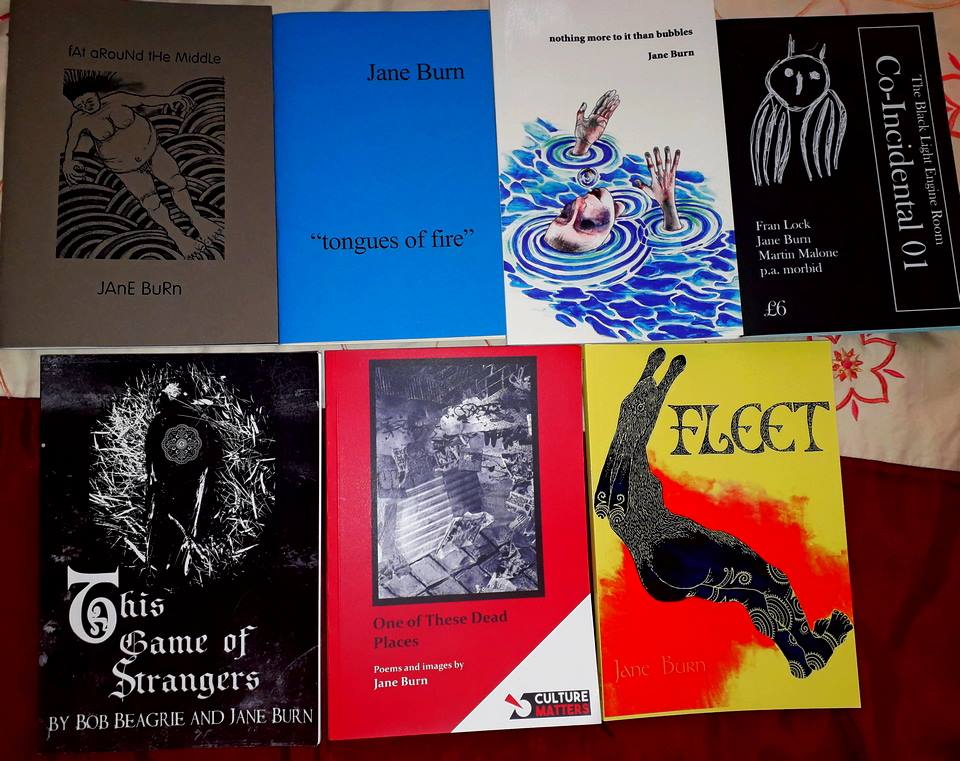
JANE BURN – POETRY AS HARD GRAFT, INSPIRATION, REACTION OR EXPERIMENT?
I interviewed poet & artist Jane Burn who won the Michael Marks Environmental Poet of the Year 2023-24 with A Thousand Miles from the Sea.
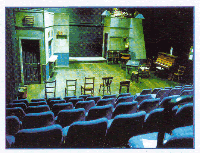
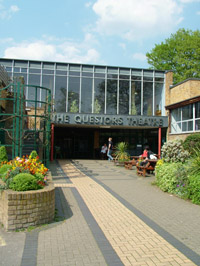
I’m sitting in the front row of Questors Theatre wearing red leggings and a couple of shorty vests covered by a slip. The slip is shiny and black; it shows my shoulders and arms – which at 70 I usually cover up – while enclosing me in a smooth, cool sheath. It’s simple, cut straight above my chest and knees, and made for theatre.
So, what am I doing here?
It’s a ‘summerslam’ event, with eleven contestants about to take the stage and present their two-minute monologues about diversity and inclusion. We’re sitting in order of appearance, like prize-day pupils. I’m third, much the oldest, with no experience of delivering lines, and wishing I’d ducked out.
…………………………..
I’d prepared at home with words on paper, typed out in full then cut and shaped over weeks of silent reading and out-loud rehearsals, but what I’d finally realised was that using my script as a prompt wasn’t enough. In fact, it was more like a journey down a road that kept giving out. One minute I was on track, the next minute I’d lost my way. So my daily run-throughs were stop-go exercises, beginning smoothly then pausing, checking my paper, before delivering a few more lines, then breaking off altogether as I realised I’d muddled something or missed out a whole section.
But on good days, when the words came naturally, I’d reel off the first few sentences, easily, at one go. They went like this:
“At five I’d dreamed I’d been marched to the woods by rough boys and tied to a tree dressed as a girl. So, I was two-spirit, lovely, floaty, free and NOT TO BLAME. Afterwards my parents were SORRY FOR ME because I’d nearly died. And at school people treated me nicely because you DON’T HIT GIRLS.”
The aim, of course, was to shock. It was a grand first statement: something so direct and truthful that no one could ignore it. But as I stood there, gesturing, I could see the child I’d been – an awkward, white-faced boy smiling seriously – and I felt for that child, staring in the mirror trying to look brave…

My script went on:
“Then at school the boys called me ‘nipple’ and dared me to fight or spit or wee up walls, then threw me to the ground and JABBED A COMPASS NEEDLE INTO MY ARM. But at home, when my parents were out, I’d get shouty. The devil was ordering me to get into my mother’s underwear drawer AND DRESS LIKE A VAMP while my angel-self pleaded, ‘No-no, that’s not you’. I sinned, of course.’’
At the mention of sin, my voice dropped. I’d been on my own: a lost boy posing in a skirt, smiling his come-ons. A Narcissus-type, locked-up in himself. And the figure in the mirror was partly me in ceremonial garb and partly an unreal stranger: I’d marked myself out as not of this world.
But my voice lifted at the end-phrase ‘of course’. I was smiling at my childish dramas and inviting the audience to join me. It was as if I was looking back from a dark space in a can’t-catch-me film, waving at my accusers.
My piece continued:
“In the bath I’d squeeze my willie backwards behind my legs to look smooth and clean and curvy. Later, as a father, I dressed at home BUT DUCKED BENEATH THE WINDOW WHEN PEOPLE CAME BY – and kept my girlie self at arm’s length.”
At that point I pulled down my slip to show my breasts. They were small but prominent like moulded wax. Cupping one in my hand, I finished my speech.
“But now I’m old and look I’ve got breasts. They’re hard and they hurt. It’s the male menopause with fatigue and depression, aches all over, sleep-loss, muscle wastage.
But I’m still that girlie-boy, two-spirit person in the woods.”
…………………………..
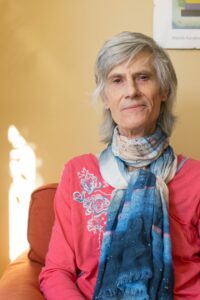
So now, I’m sitting in Questors Theatre checking my script. It’s small-print, typed on card and fits in one hand. It reminds me of my childhood magic card tricks. Like them, I try to keep it hidden.
As my monologue gets closer, my legs get restless. I try distracting myself by gazing at the empty stage with its brightly-lit centre spot. Behind me, in the tiered auditorium, the audience are chatting and shifting about. As five people enter from behind a screen, the lights dim and the voices stop. It’s the judges, who take their places in what looks like a pre-arranged order. The woman in the middle, wearing a silk scarf and red heels, sits down first. It’s almost as if the others have to wait for her before they too can sit.
When the first monologue begins, I realise I’m not going to win. The actor is young, he speaks conversationally with his eyes raised, talking to the back row as if he knew them well. He has lift and range and presence. The act that follows is a woman who delivers Lorca in a singsong popular voice. She, too, has a direct line of contact with the audience. Neither of them pause, or appear to be lost for words. In fact, they don’t seem to be actors at all but real live, face-to-face characters introducing themselves.
When it’s my turn I take my place on stage. I’ve been warned that I’ll be timed out by a bell so I start straightaway. There’s a small part of me on fast forward running through my speech; the rest of me is in action mode, delivering it. So I’m both performer and prompt, and my voice leads me, going high, going low, as I work the changes. And yes, it is a performance; I’m here on the spot, but also somewhere else, and my words fill the gap between me and the audience.
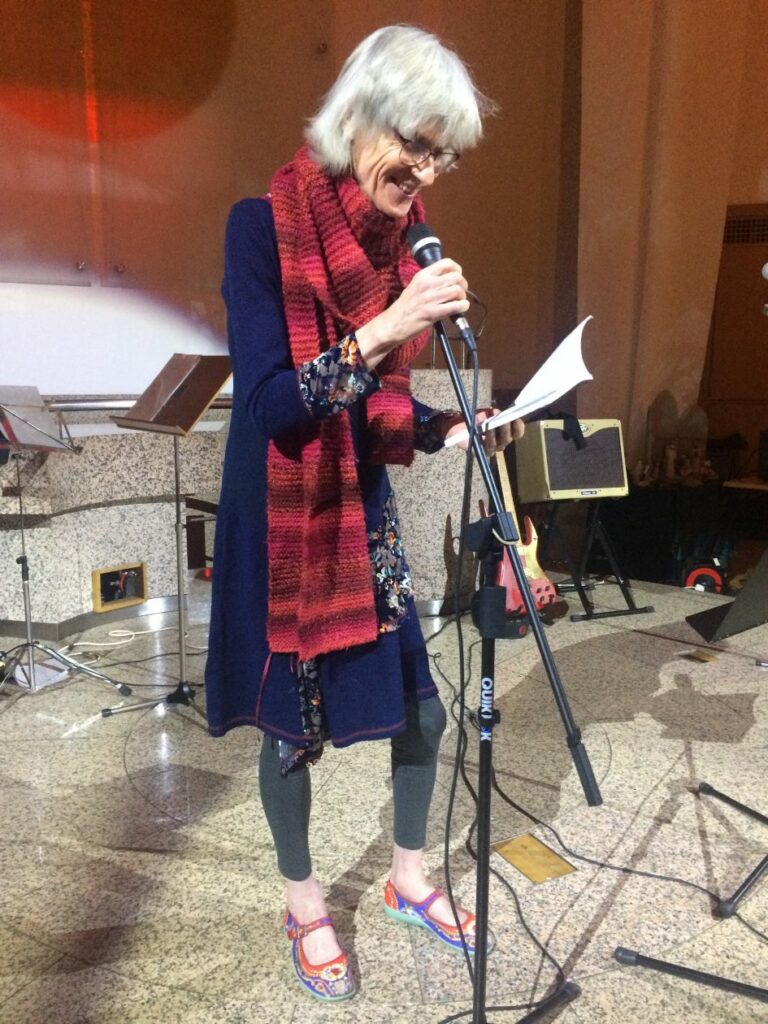
But I get through it, and towards the end I hear my voice rising, projecting to the back row. The bell rings and I squeeze in a few last words before sitting down. It’s a relief to be finished and the burst of applause surprises me, bringing me back to myself. Inwardly I’ve blanked, but outwardly I’ve joined the audience as an observer. So when the next actor is called I listen without trying to rate her. It’s a practised piece, full of powerful social commentary. When she finishes, her place is taken by another actor and another until the monologues end and the judges retire. Their exit marks the end of the summerslam for the performers. It’s a weight off my shoulders, almost as if the contest had never happened.
In the interval I put myself around talking to the actors. I’m in listening mode, collecting ideas for writing up the show. I ask them about learning lines and speaking with passion, and putting the two together. Their answers are various.
One actor uses a long mirror to practise her role, another drills herself to learn the words first, minus expression, a man uses repeat-chanting to music, another isolates passages and keeps re-reading; there are body-types who link words with actions and out-of-body types who just do it and chameleon-types who hide behind their words – they all have their own worked-out private routines. But what strikes me, mostly, is how they take to it naturally, without thought, like swimming or dancing, and just keep going and going…
So now, looking back, what did I learn?
• Acting is a branch of self-observation, practised obsessively like a top-level sport.
• Getting up on stage blurs the boundary between truth and illusion, creating its own special form of magic thinking.
• Acting is a way of being; it’s a fine art form and a gift.
• Playing a part requires more than a few week’s solo practice.
• Acting isn’t about the self-styled performer who overcomes impossible odds or the self-appointed talent stepping on stage to outdo the professionals. It’s a meditative discipline that comes from the soul.
• My attempt to act was a once-and-once-only.
And what happened next, when the judges returned? The winner was announced, the runner-up was named, thanks were given and the chosen actors were applauded.
I was glad I didn’t get a mention.
Leslie Tate
If you enjoyed this story you might want to try one of these three books:
Next week I interview prize-winning children’s books illustrator Nicola Kent.

I interviewed poet & artist Jane Burn who won the Michael Marks Environmental Poet of the Year 2023-24 with A Thousand Miles from the Sea.
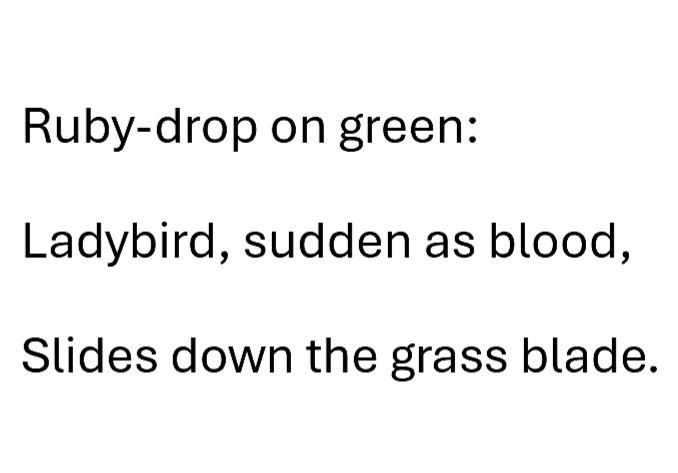
I interviewed ex-broadcaster and poet Polly Oliver about oral and visual poetry, her compositional methods, and learning the Welsh language. Polly says, “I absolutely love
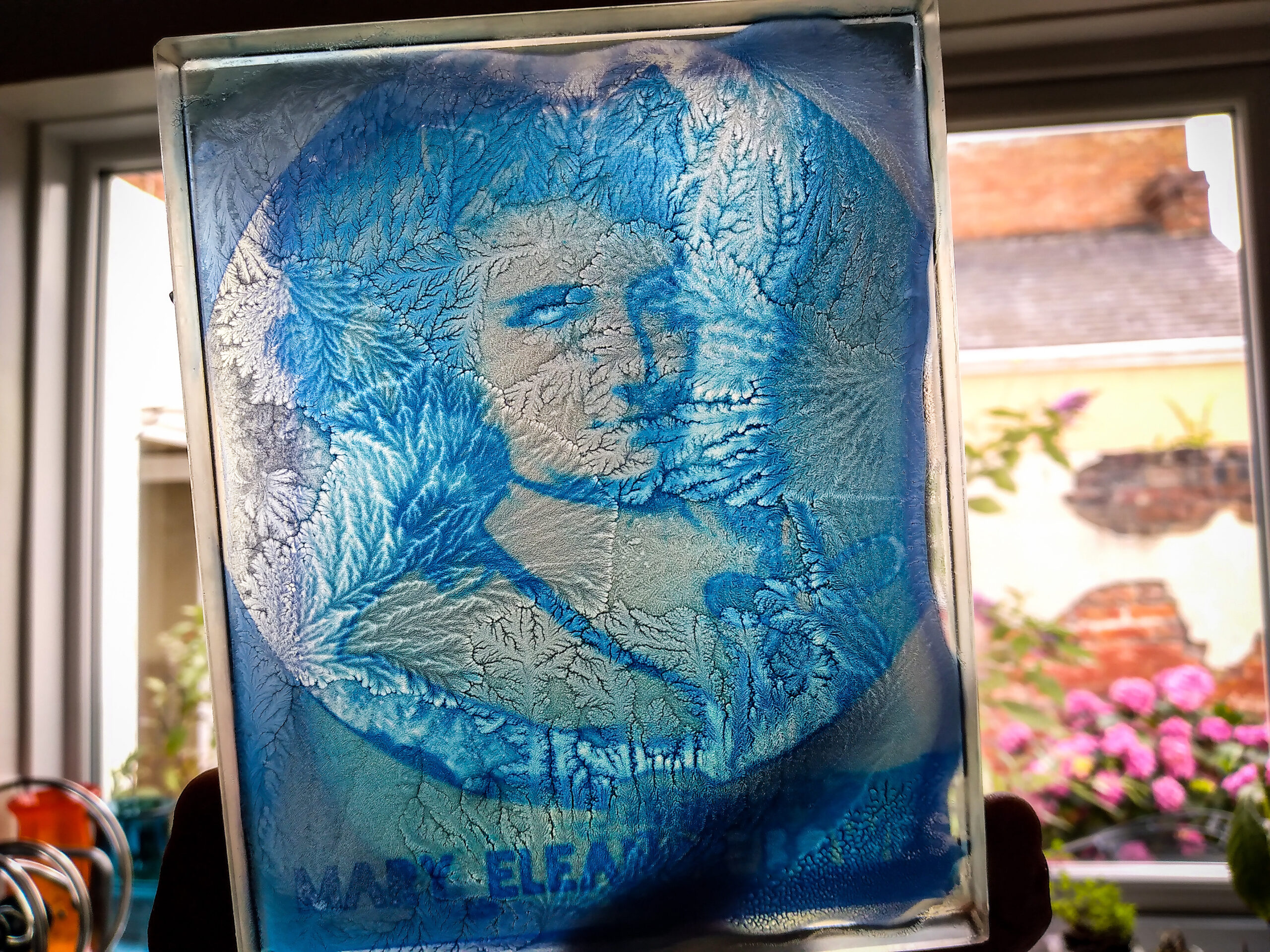
I interviewed Jo Howell who says about herself: “I’ve been a professional photographic artist since I left Uni in 2009. I am a cyanotype specialist.
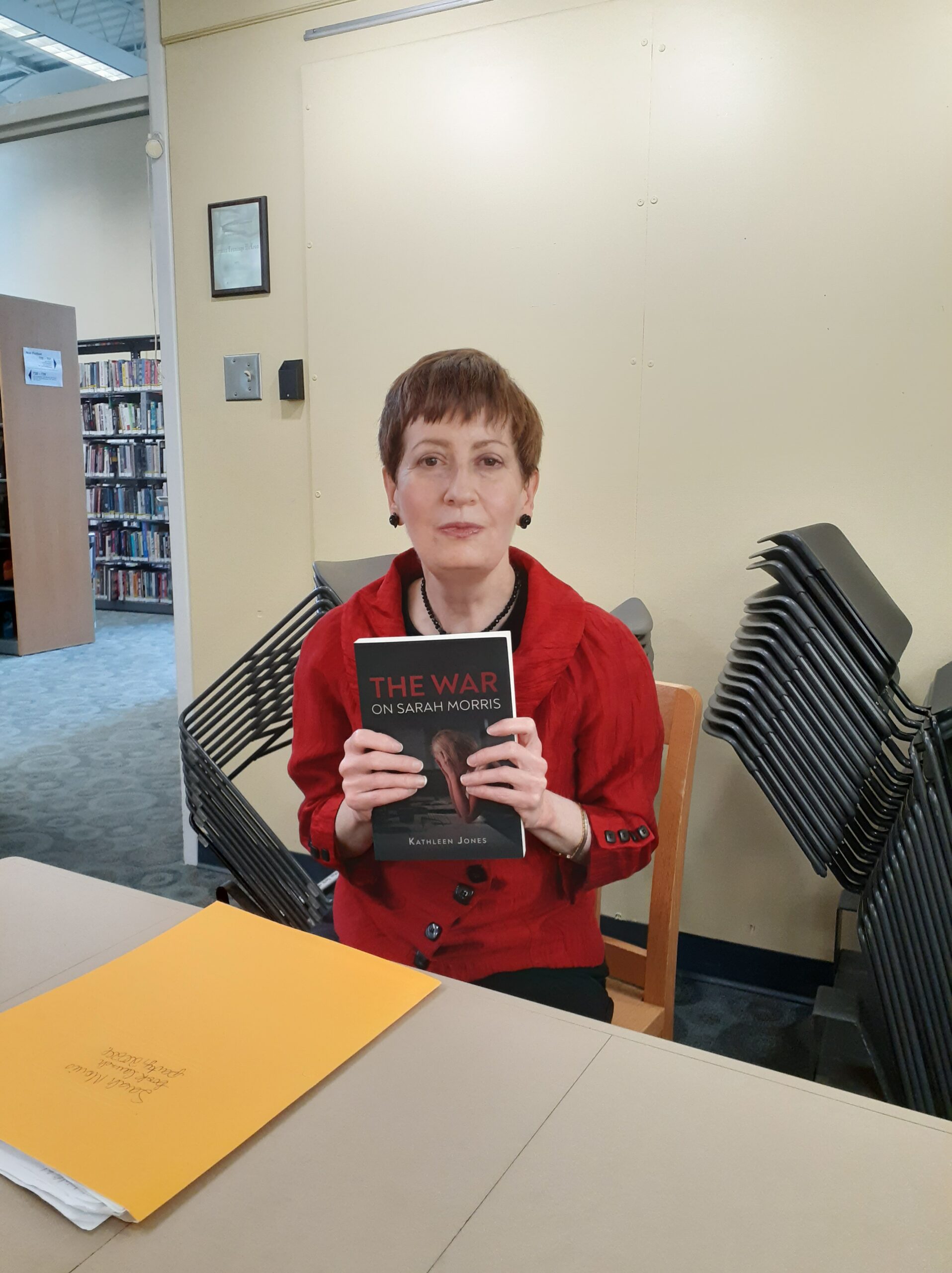
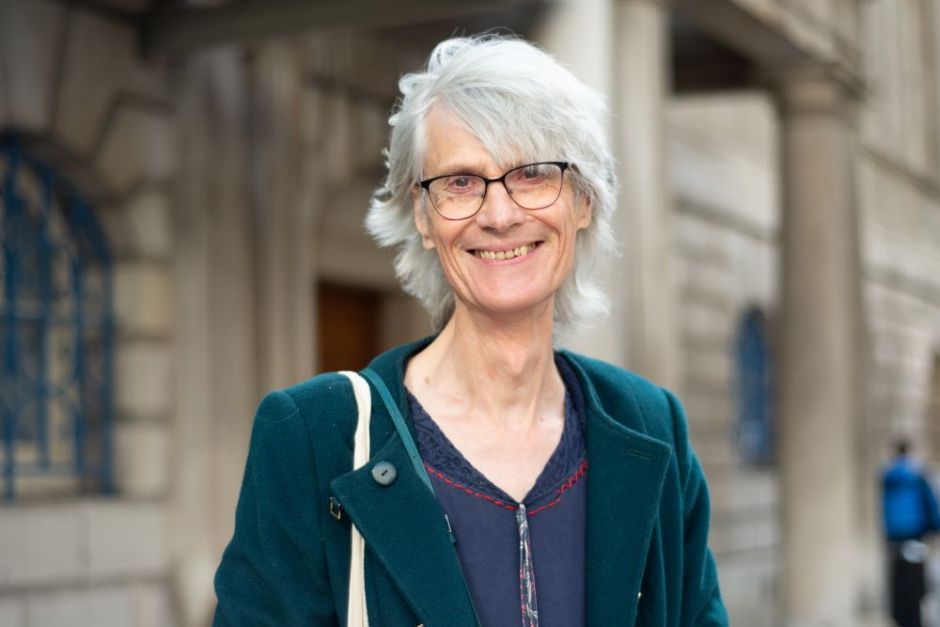
Poet Tracey Rhys, writer of Teaching a Bird to Sing and winner of the Poetry Archive’s video competition reviews Ways To Be Equally Human. Tracey,
| Cookie | Duration | Description |
|---|---|---|
| cookielawinfo-checkbox-analytics | 11 months | This cookie is set by GDPR Cookie Consent plugin. The cookie is used to store the user consent for the cookies in the category "Analytics". |
| cookielawinfo-checkbox-functional | 11 months | The cookie is set by GDPR cookie consent to record the user consent for the cookies in the category "Functional". |
| cookielawinfo-checkbox-necessary | 11 months | This cookie is set by GDPR Cookie Consent plugin. The cookies is used to store the user consent for the cookies in the category "Necessary". |
| cookielawinfo-checkbox-others | 11 months | This cookie is set by GDPR Cookie Consent plugin. The cookie is used to store the user consent for the cookies in the category "Other. |
| cookielawinfo-checkbox-performance | 11 months | This cookie is set by GDPR Cookie Consent plugin. The cookie is used to store the user consent for the cookies in the category "Performance". |
| viewed_cookie_policy | 11 months | The cookie is set by the GDPR Cookie Consent plugin and is used to store whether or not user has consented to the use of cookies. It does not store any personal data. |
9 responses
This really is fascinating, Leslie. I don’t mind presenting to an audience on non-fiction information, but acting is something else entirely. It sounds like you did really well.
Thank you, Robbie. It was a lesson, certainly! 🙂 🙂 🙂
Really great reflective write up Leslie that is so you.
You did yourself proud and sounds like you enjoyed the experience. Thanks for your honest sharing. X
I know how hard pressed you are for time, so thank you for reading it, Paul!
I am with Robbie. It’s quite different to give a talk at a conference or read a paper you’ve written, but perhaps we perform more than we realise. Well done!
Thank you, Olga. Yes, there is a theory that we perform our gender… 🙂 🙂 🙂
Dear Leslie,
The writing you share with us is so often self-revelatory., as are so many of your actions in life: who and what you choose to love; what you’ve been able to let go of…what you are willing to fight for.
What has always struck me, from far away, safely tucked away here at home, is how courageous you are. It is your most adamant quality.. Why I love it so, is because it lets me know you better and sooner, and because it is BRAVE. And so, I love you easily and all the more.
This experience/experiment you dared to take on says so much about the stuff of which you are made. Well done!
(tell me, did any of the other participants use material they had written themselves?)
I will send this link to Christian. I’d love to hear his response.
I will quote you to Christian:
“Acting isn’t about the self-styled performer who overcomes impossible odds or the self-appointed talent stepping on stage to outdo the professionals. It’s a meditative discipline that comes from the soul.”
merci mon ami! xoxo
Thank you, Michelle. I hesitate to say this because it could been seen as a pressure, but you set an example to others who are in a similar position to you. It’s by occupying the public sphere that you survive – so please keep doing both! You are our Amazon/Antigone. There were two other self-scripted performances on that night. I think anyone would have had a very difficult job to decide the winner!
♥️??